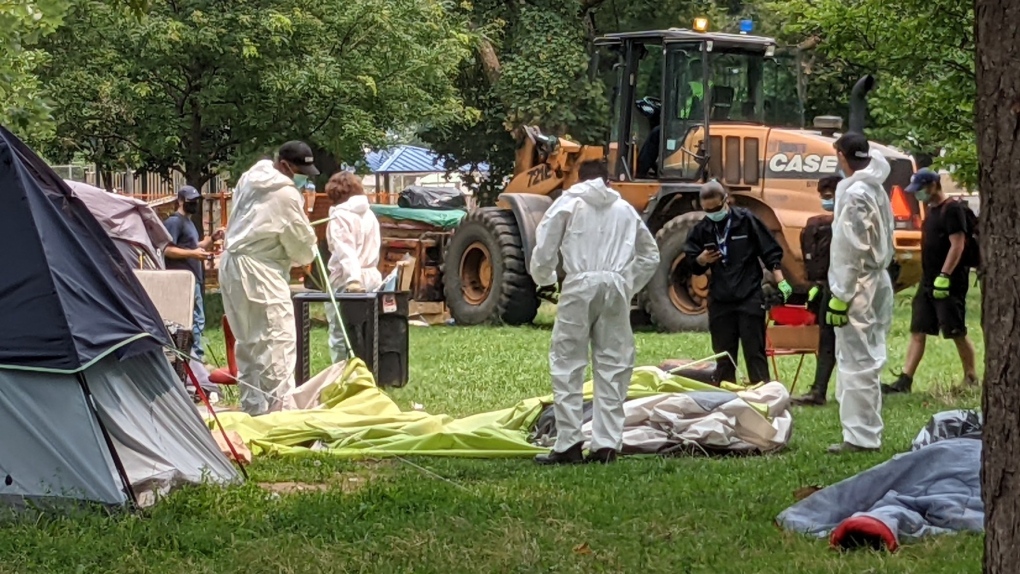'Outreach, assistance, information': Toronto's new encampment strategy to move away from enforcement, says city
Toronto is looking to take a new approach to the way it responds to homeless encampments on its properties, one that shifts away from enforcement and instead focuses on “outreach, assistance, and information.”
On Wednesday afternoon, Coun. Alejandra Bravo, chair of the city’s Economic and Community Development Committee, along with Gord Tanner, general manager of Shelter and Support Services, shared details about Toronto’s updated encampment strategy as well as the steps the city is taking to better support people experiencing homelessness.
Bravo, in her remarks, said that every resident of Toronto, housed or unhoused, “deserves to be treated with dignity and … has an inherent right to be respected … and “treated fairly.”
“They are our constituents whether they are housed or unhoused,” she said, noting that when the city cleared several large homeless encampments in the summer of 2021 it caused “great harm.”
The Davenport councillor said that Toronto’s new approach, which the city indicated in a news release is based on “feedback from the public, interested parties and recommendations from the City’s Ombudsman,” is focused on ensuring the human right to housing, while also treating people who are unhoused with “compassion and care.”
One of the key ways that can be achieved, she said, is through “enhanced multi-sectoral case management support for people living outdoors,” a pilot program that is being employed by the city in Allan Gardens and Clarence Square parkette to help people staying there find permanent shelter. Among other things, it entails the city working in close partnership with agencies and health-care experts to address the complex mental and physical health needs of individuals experiencing homeless, she said.
“There's no easy solution and providing real pathways to shelter and housing works and meeting people's needs has already shown some positive results in our city,” Bravo said, adding that a “transparent process” with a range of options is essential.
She also pointed to the need for more financial support from the provincial government, which she said would help meet the demand and support transitions for people living outdoors and in Toronto’s shelter system to permanent housing. Specifically, the city is seeking $54 million for the Canada-Ontario Housing Benefit Program. This funding would allow 300 households to be moved each month from the shelter system into permanent housing.
Further, Bravo mentioned the city’s shelter safety study, which will include an assessment of needs undertaken this fall, followed by a shelter safety plan and Toronto’s first shelter capital plan, as being part of this evolved strategic approach for supporting people experiencing homelessness.
“It's an urgency, of course, that's joined by the commitment of this mayor and this council, to build more affordable housing,” she said.
The updated strategy also includes lowering barriers to indoor spaces like respites and smaller shelters as well as permanent housing.
 Coun. Alejandra Bravo and Gord Tanner, general manager of the city's Shelter and Support Services, spoke during a May 22 news conference on the updated strategy for encampments and supporting people experiencing homelessness in Toronto. (Kenneth Enlow/CP24)
Coun. Alejandra Bravo and Gord Tanner, general manager of the city's Shelter and Support Services, spoke during a May 22 news conference on the updated strategy for encampments and supporting people experiencing homelessness in Toronto. (Kenneth Enlow/CP24)
Tanner, meanwhile, called encampments a “symptom of the affordable housing crisis” coupled with “shelter demand that exceeds availability and other social challenges such as the mental health crisis and drug toxicity crisis.”
“Toronto continues to see unprecedented pressure our emergency shelter system due to inflated costs of living, insufficient affordable and rent-geared-to-income housing, inadequate income supports, and an increase in the number of refugee claimants arriving in the city,” he said.
“We're working to address each of these issues, but in the meantime, we don't want people to continue to be at risk.”
He said that the city is keeping that in mind as it both enhances and evolves its approach to encampments and supports for unhouse individuals, which will “offer certainty and help bring dignity to people experiencing homelessness and surrounding communities.”
Tanner said that there are a number of “key pillars” to the city’s new approach.
“The first is expanding enhanced housing-focused outreach and support to other encampments. It's exploring new service models for people that are living outdoors. It’s about enhancing safety and our shelter system both for our staff and our clients. And finally, it must be about increasing housing opportunities and shelter system flow,” he said.
“We know great success comes from meeting people where they are at. The city has added an enhanced outreach model to his encampment toolkit that allows us to provide increased security, amenities, health services, and outreach. We know this approach works. Dufferin Grove Park and Allan Gardens demonstrate that we can reduce encampments and help people transition to shelter and permanent housing.”
As of May 5, there were 256 encampments on city property.
New strategy respects Ombudsman recommendations: city
Tanner went on to say that the city has “taken to heart” the 31 recommendations outlined in the Toronto Ombudsman’s March 2023 report on the clearing of encampments at three downtown parks in the summer of 2021.
In it, Ombudsman Kwame Addo found that Toronto chose “speed over people” and “showed significant unfairness” in the way it handled the clearing of these sites at Alexandra and Trinity Bellwoods parks, and Lamport Stadium, and was insufficient and inconsistent in its engagement with the park residents showing a “lack of understanding about their reality.”
“We know there are better options instead. The city now takes an approach that involves outreach to operation and exhausting available tools and options to assist people,” said Tanner, adding the support of government partners in this effort is essential.
“We're committed to continue to learn from what goes well and what doesn't and will continue to consult with those experiencing homelessness experts, partner organizations and communities, and we thank them all for their thoughts, feedback.”
 City of Toronto workers clear a homeless encampment at Alexandra Park on July 20, 2021. (Joanna Lavoie photo)
City of Toronto workers clear a homeless encampment at Alexandra Park on July 20, 2021. (Joanna Lavoie photo)
City staff is expected to present the report on Toronto’s Encampment Approach and Strategy to the Economic and Community Development Committee on May 29.
CTVNews.ca Top Stories

Gunman in Toronto shooting was not evil, but 'broken' by fraud dispute: wife
The wife of the gunman in Monday's double murder-suicide in North York says she doesn't consider her husband an evil person, but one who was 'broken' by a lengthy fraud dispute that saw their family savings drained.
Feels like 40: Heat wave sticking around in Ontario, Quebec, Maritimes
A heat wave that's washed over eastern Canada is sticking around for a little while still.
Why olive oil is so expensive right now, and the impact it's having on restaurants
Canadian restaurants that rely on what is being called 'liquid gold' as the backbone of their menu are being forced to eat a massive extra cost during a worldwide olive oil shortage.
Ont. mother loses $6K during Facebook marketplace transaction
An Ontario woman is sharing her story after she lost $6,000 by clicking a fraudulent link disguised to look like an e-transfer during a Facebook Marketplace transaction.
Russia obliterates Ukraine's front-line towns faster with hacked bombs and expanded air base network
Russia has accelerated its destruction of Ukraine's front-line cities in 2024 to a scale previously unseen in the war using the glide bombs and an expanding network of airstrips, according to an Associated Press analysis of drone footage, satellite imagery, Ukrainian documents and Russian photos.
Police look to identify 'nudist runner of the woods' caught on camera in western Quebec
The MRC des Collines-de-l'Outaouais police say the owner of a Val-des-Mont business discovered security camera footage of someone running naked across his property on June 8 around 1:30 a.m.
Can a marriage survive a gender transition? Yes, and even thrive. How these couples make it work
A partner's gender transition does not necessarily mean a death sentence for a marriage. Data is scant, but couples and therapists say that in many cases, a relationship grows and flourishes under the light of new honesty.
Has your car been stolen after a visit to a mechanic?
There may be connections between vehicle thefts and recent visits made to body shops in Canada, according to some victims. Have you been a victim of car theft? What were the circumstances? CTVNews.ca wants to hear from you.
Marge Simpson's likeness found in ancient Egyptian coffin. What does this discovery mean?
Coffin lids during the New Kingdom era are known for their intricate designs, but this particular cover was remarkable for another reason from the perspective of social media users and fans of the longtime Fox animated sitcom 'The Simpsons.'































